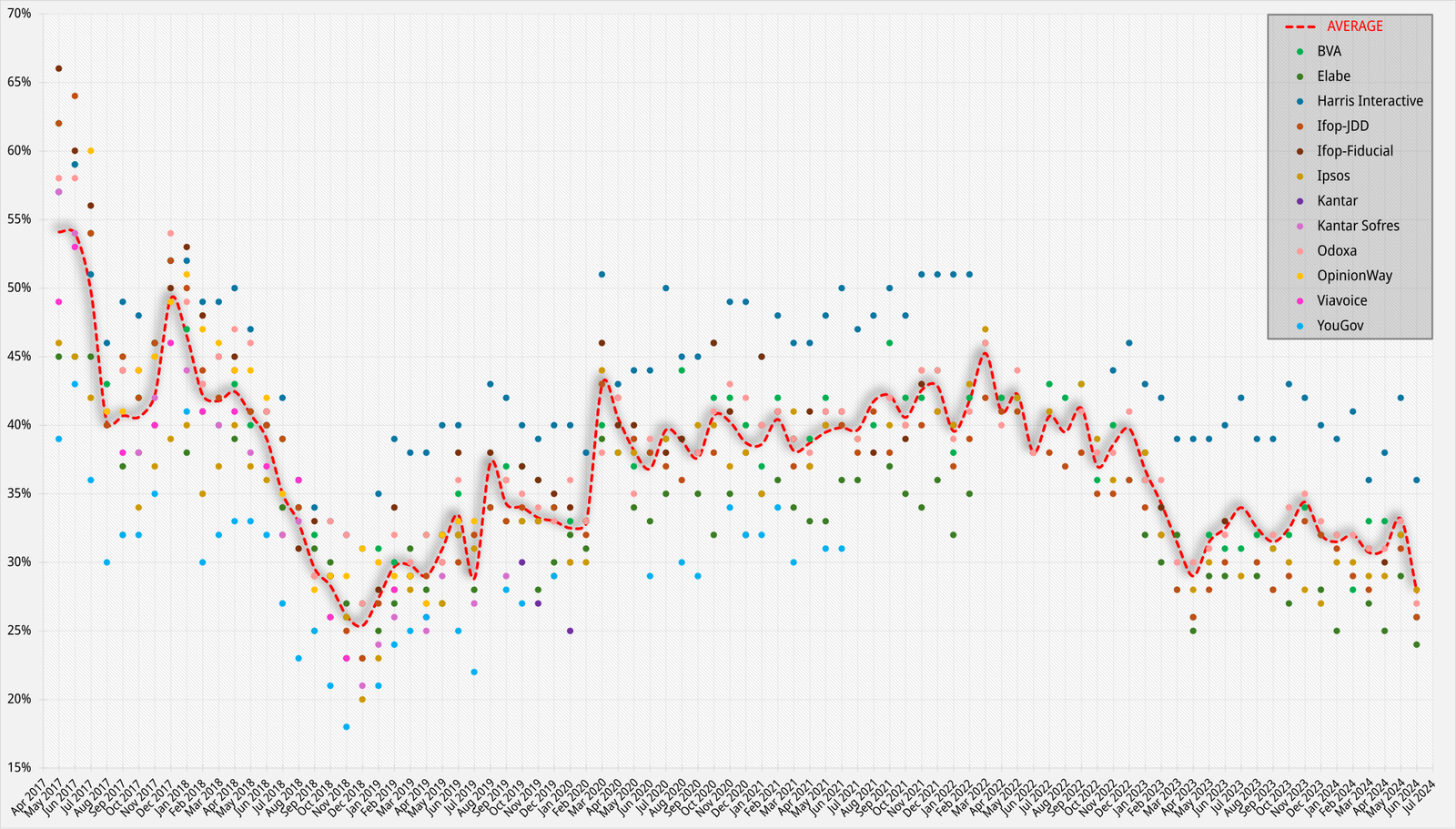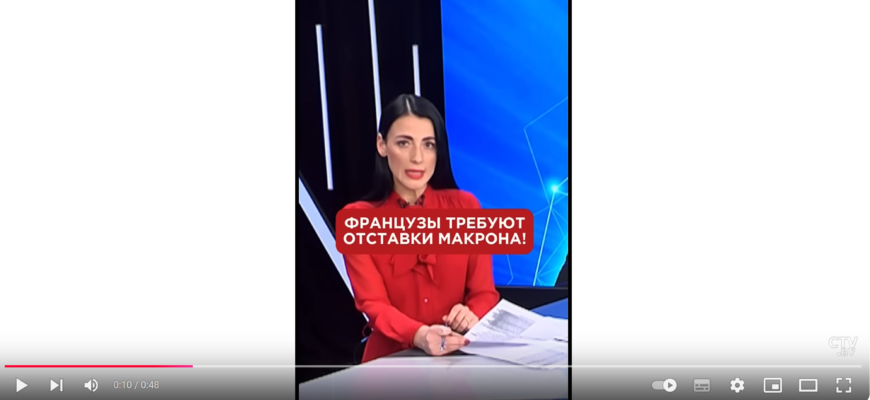Collected Information Policy Blog data on Belarusian YouTube channels allows for an analysis of the most-viewed videos regarding various disinformation narratives.
Here, we analyze a video that garnered almost 600,000 views with a clickbait title: French People Demand Macron’s Resignation! #france #macron #europeanunion #politics #news #shorts #tv #ctv
The video stated the following:
President Macron’s chair is shaking once again. Over the past few months, he has repeatedly fended off attempts to remove him from office. Now, the left-wing opposition, represented by the “France Unbowed” party, has made a similar call. The reason for this new push to remove the president is the next year’s budget proposed by the Cabinet, which includes harsh austerity measures, cutting expenses by 40 billion euros. Additionally, the government plans to raise taxes to boost the treasury by 20 billion euros. The opposition’s dissatisfaction is shared by ordinary French citizens. According to the latest polls, over 60% of residents want Macron out as soon as possible.
Our verdict:
ContentsVerdict: Distortion of Facts or Manipulation
Indeed, France is experiencing a significant political and economic crisis. You can read about the reasons in analytical materials from credible and reputation-conscious sources.
On Friday, December 13, 2024, François Macron appointed François Bayrou (b. 1951) as Prime Minister to tackle the crisis in France.

Bayrou’s primary task will be to form a government that the opposition cannot quickly overthrow—a challenging task, given that most ministers will come from a narrow coalition of pro-Macron and conservative deputies from the previous cabinet.
The far-left party France Unbowed (NB: the one referenced in the CTVBY segment) has already pledged to table a no-confidence motion against Bayrou. However, Marine Tondelier, leader of the Green Party and a key figure in the broad left-wing alliance, stated that her party would wait but has “no choice” but to topple the new prime minister if he continues Macron-era policies and keeps outgoing ministers in key positions.
While Socialist leader Olivier Faure criticized Bayrou’s appointment as a “choice that could deepen the democratic crisis,” he also signaled a willingness to work with the new government. The Socialist Party stated that it would not vote to remove the government unless Bayrou resorts to using constitutional maneuvers to push legislation through without parliamentary approval.
This text demonstrates that all democratic principles of governance remain intact in France.
Now, let’s look at Macron’s approval ratings:

Firstly, when reporting numbers on a major media channel like the national broadcaster CTV, it is essential to inform the audience about the source of the data and who conducted the polls.
Secondly, this chart is taken from the article: Opinion polling on the Emmanuel Macron presidency.
Most importantly, these are data from 12 (sic!) polling companies, and the spread can be significant due to numerous methodological factors, each of which requires an explanation.
Now, let us analyze the disinformation narratives:
Narrative 1: Political Instability
Type and Description of the Narrative: A narrative about political instability and a crisis of authority.
Manipulative Techniques Used:
- Generalizations: “Over 60% of residents want Macron out as soon as possible” creates the impression of widespread dissatisfaction.
- Emotionally charged language: “Macron’s chair is shaking,” “opposition dissatisfaction” emphasizes vulnerability.
Linguistic Markers: Words like “shaking,” “dissatisfaction,” and “call” create a sense of crisis and threat.
Psychological Mechanisms: Emotional triggers: Fear and anxiety about the country’s future.
Credibility Assessment: 70 (lack of concrete data on the reasons for dissatisfaction).
Potential Harm: Increased political polarization and dissatisfaction, potentially leading to social conflicts.
Narrative 2: Economic Hardship
Type and Description of the Narrative: A narrative about harsh austerity measures and their consequences for the population.
Manipulative Techniques Used:
- Misrepresentation of causality: Assumes that austerity measures directly lead to dissatisfaction.
- Partial quotations: Possible positive outcomes of the budget are omitted.
Linguistic Markers: Phrases like “harsh austerity measures” and “40 billion euros in cuts” emphasize negative aspects.
Credibility Assessment: 75 (additional data on the budget’s consequences needed).
Comprehensive Assessment
The text uses manipulative techniques to create an image of political instability and economic hardship, which could amplify public dissatisfaction.
Level of Manipulation: High.
Recommendations
Key Points for Fact-Checking: Verify data on opposition support and the actual consequences of the proposed budget.
Suggested Counter-Narratives: Emphasize potential positive outcomes of the budget and the need for economic reforms.
Countermeasures: Educational campaigns on the importance of economic measures and their long-term benefits.
Reliable Sources for Verification: Official government reports, independent economic research.










